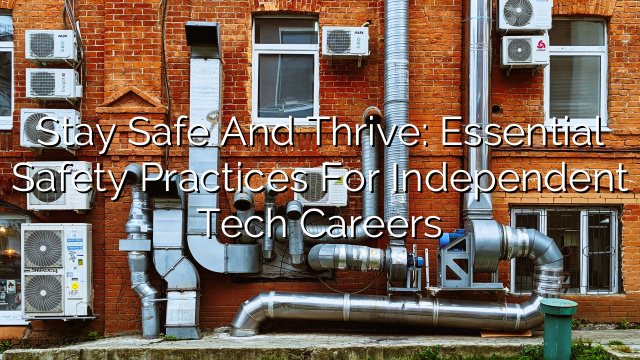Introduction
When it comes to heating, ventilation, and air conditioning (HVAC) systems, the safety of both the technicians and the building occupants should be the top priority. Understanding the legal side of HVAC safety is essential for all HVAC professionals and building owners. Compliance with relevant regulations and standards ensures the safe operation of HVAC systems, reduces the risk of accidents, and helps to avoid legal troubles. In this article, we will discuss why compliance matters and the main areas of HVAC safety that need to be addressed.
The Importance of HVAC Safety Compliance
- Protecting Technicians
Working with HVAC systems can be dangerous if proper safety measures are not followed. Compliance with safety standards helps to protect technicians from potential hazards such as electrical shocks, burns, and falls. It ensures that technicians receive proper training, use appropriate personal protective equipment, and follow safe work practices.
- Safeguarding Building Occupants
HVAC systems play a crucial role in providing comfortable and healthy indoor environments. Compliance with safety regulations and standards ensures that HVAC systems operate efficiently and do not pose any risks to building occupants. It includes regular maintenance, inspections, and the use of proper installation practices to prevent issues such as carbon monoxide leaks and the spread of airborne contaminants.
- Avoiding Legal Troubles
Non-compliance with HVAC safety regulations can lead to serious legal troubles. Building owners and HVAC professionals may face hefty fines, penalties, and even legal actions in case of accidents or violations. Compliance not only helps to avoid legal consequences but also fosters trust and confidence among clients and building occupants.
- Ensuring Energy Efficiency
HVAC systems are significant energy consumers in buildings. Compliance with energy efficiency standards and regulations helps to optimize the performance of HVAC systems, reduce energy wastage, and lower energy costs. It includes the proper installation of energy-efficient equipment, regular maintenance, and the implementation of energy-saving practices.
Main Areas of HVAC Safety Compliance
- Electrical Safety
Electrical safety is a critical aspect of HVAC system installations and maintenance. Compliance with electrical safety standards ensures that proper measures are in place to prevent electrical hazards. This includes the correct installation of wiring and electrical components, the use of proper insulation, and regular inspections to identify and address any potential electrical issues.
- Fire Safety
HVAC systems, particularly those using fuel-burning equipment, can pose fire hazards if not maintained properly. Compliance with fire safety regulations involves regular inspections of equipment, the use of appropriate fire suppression systems and devices, and proper ventilation to prevent the accumulation of combustible gases.
- Indoor Air Quality
Indoor air quality (IAQ) is directly influenced by HVAC systems. Compliance with IAQ standards ensures that HVAC systems effectively remove pollutants from the indoor air and provide adequate ventilation. This includes regular maintenance of filters, duct cleaning, and the use of high-quality air filters.
- Refrigerant Management
HVAC systems that use refrigerants can have a significant impact on the environment if not properly managed. Compliance with refrigerant management regulations involves the proper handling, storage, and disposal of refrigerants to minimize their release into the atmosphere. It also includes the use of environmentally friendly refrigerants.
- Noise Control
HVAC systems can generate noise that may disturb building occupants. Compliance with noise control regulations ensures that HVAC systems operate within acceptable noise levels. This includes the use of noise-attenuating materials, proper equipment installation, and regular maintenance to minimize noise generation.
FAQs
- Why is HVAC safety compliance necessary?
HVAC safety compliance is necessary to protect technicians, safeguard building occupants, avoid legal troubles, and ensure energy efficiency.
- What are the main areas of HVAC safety compliance?
The main areas of HVAC safety compliance include electrical safety, fire safety, indoor air quality, refrigerant management, and noise control.
- What are the consequences of non-compliance with HVAC safety regulations?
Non-compliance with HVAC safety regulations can lead to fines, penalties, legal actions, and potential risks to technicians and building occupants.
- How can building owners ensure HVAC safety compliance?
Building owners can ensure HVAC safety compliance by hiring licensed and experienced HVAC professionals, conducting regular inspections, and following maintenance recommendations.
- What role do HVAC professionals play in ensuring safety compliance?
HVAC professionals play a crucial role in ensuring safety compliance by following industry standards, staying updated with regulations, and providing proper training to technicians.
Conclusion
Understanding the legal side of HVAC safety is essential for both HVAC professionals and building owners. Compliance with safety regulations and standards not only ensures the safety of technicians and building occupants but also helps to avoid legal troubles and promote energy efficiency. By addressing areas such as electrical safety, fire safety, indoor air quality, refrigerant management, and noise control, HVAC professionals and building owners can create a safe and healthy indoor environment for everyone.







